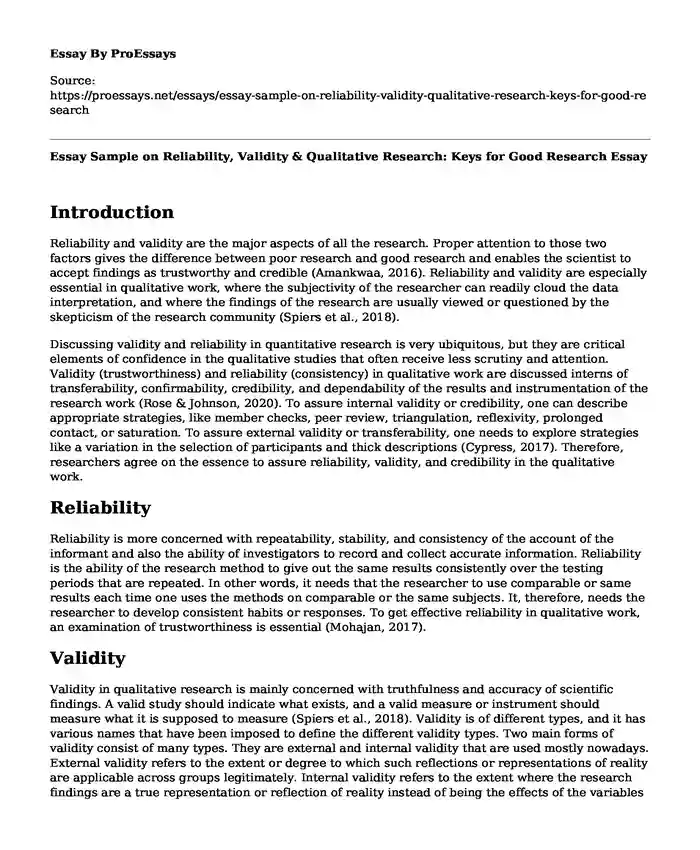Introduction
Reliability and validity are the major aspects of all the research. Proper attention to those two factors gives the difference between poor research and good research and enables the scientist to accept findings as trustworthy and credible (Amankwaa, 2016). Reliability and validity are especially essential in qualitative work, where the subjectivity of the researcher can readily cloud the data interpretation, and where the findings of the research are usually viewed or questioned by the skepticism of the research community (Spiers et al., 2018).
Discussing validity and reliability in quantitative research is very ubiquitous, but they are critical elements of confidence in the qualitative studies that often receive less scrutiny and attention. Validity (trustworthiness) and reliability (consistency) in qualitative work are discussed interns of transferability, confirmability, credibility, and dependability of the results and instrumentation of the research work (Rose & Johnson, 2020). To assure internal validity or credibility, one can describe appropriate strategies, like member checks, peer review, triangulation, reflexivity, prolonged contact, or saturation. To assure external validity or transferability, one needs to explore strategies like a variation in the selection of participants and thick descriptions (Cypress, 2017). Therefore, researchers agree on the essence to assure reliability, validity, and credibility in the qualitative work.
Reliability
Reliability is more concerned with repeatability, stability, and consistency of the account of the informant and also the ability of investigators to record and collect accurate information. Reliability is the ability of the research method to give out the same results consistently over the testing periods that are repeated. In other words, it needs that the researcher to use comparable or same results each time one uses the methods on comparable or the same subjects. It, therefore, needs the researcher to develop consistent habits or responses. To get effective reliability in qualitative work, an examination of trustworthiness is essential (Mohajan, 2017).
Validity
Validity in qualitative research is mainly concerned with truthfulness and accuracy of scientific findings. A valid study should indicate what exists, and a valid measure or instrument should measure what it is supposed to measure (Spiers et al., 2018). Validity is of different types, and it has various names that have been imposed to define the different validity types. Two main forms of validity consist of many types. They are external and internal validity that are used mostly nowadays. External validity refers to the extent or degree to which such reflections or representations of reality are applicable across groups legitimately. Internal validity refers to the extent where the research findings are a true representation or reflection of reality instead of being the effects of the variables that are extraneous (Mohajan, 2017).
Conclusion
As indicated previously, researchers should be attuned to various aspects that impart risks to the reliability and validity of the plan and findings and implement strategies or tactics to counter or avoid them. One of the major aspects affecting reliability and validity is an error. Error is imposed in all the investigations that are related to reliability and validity inversely. The larger the degree of error, the less truthful and accurate the results (Cypress, 2017). Researchers, therefore, must be watchful, especially of the error sources when implementing and planning their studies. For the sake of conveniences, major error sources can be grouped in the following manner: the subjects participating in the project, the data collection and analysis method, the social context or situation, and the researcher (Rose & Johnson, 2020).
References
Amankwaa, L. (2016). CREATING PROTOCOLS FOR TRUSTWORTHINESS IN QUALITATIVE RESEARCH. Journal of Cultural Diversity, 23(3). https://www.semanticscholar.org/paper/CREATING-PROTOCOLS-FOR-TRUSTWORTHINESS-IN-RESEARCH.-Amankwaa/987e3b05cf2d37b85cfbb7a92955621f6c73f5d6
Cypress, B. S. (2017). Rigor or reliability and validity in qualitative research: Perspectives, strategies, reconceptualization, and recommendations. Dimensions of Critical Care Nursing, 36(4), 253-263. doi: 10.1097/DCC.0000000000000253
Mohajan, H. K. (2017). Two criteria for good measurements in research: Validity and reliability. Annals of Spiru Haret University. Economic Series, 17(4), 59-82. https://www.ceeol.com/search/article-detail?id=673569
Rose, J., & Johnson, C. W. (2020). Contextualizing reliability and validity in qualitative research: toward more rigorous and trustworthy qualitative social science in leisure research. Journal of Leisure Research, 1-20. https://doi.org/10.1080/00222216.2020.1722042
Spiers, J., Morse, J. M., Olson, K., Mayan, M., & Barrett, M. (2018). Reflection/Commentary on a Past Article: “Verification Strategies for Establishing Reliability and Validity in Qualitative Research” https://doi.org/10.1177%2F1609406918788237
Cite this page
Essay Sample on Reliability, Validity & Qualitative Research: Keys for Good Research. (2023, Sep 17). Retrieved from https://proessays.net/essays/essay-sample-on-reliability-validity-qualitative-research-keys-for-good-research
If you are the original author of this essay and no longer wish to have it published on the ProEssays website, please click below to request its removal:
- Apple SWOT Analysis Paper Example
- Essay Sample on SWOT and PEST for Strategy Formulation in Healthcare Organizations
- Indianapolis Super Bowl Marketing Analysis Paper Example
- Essay Sample on Gucci's "Blackface" Incident
- Essay on Blackwell Medical Center: Leveraging Strengths to Overcome Weaknesses
- Essay Sample on Statistical and Clinical Significance
- SWOT Analysis of PepsiCo - Report Sample







